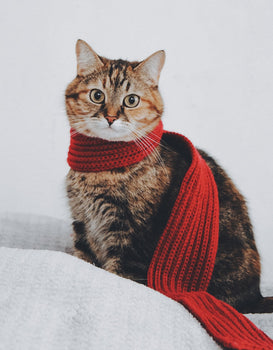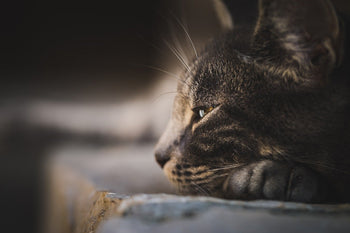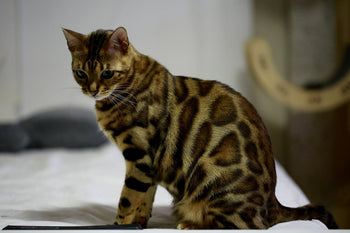Tortoiseshell Cat: Characteristics and Care Tips
Tortoiseshell cats, also known as "torties," are beloved by many cat enthusiasts for their unique coat pattern and charming personalities. These cats are not a specific breed but rather a coat pattern that can be found in many different breeds.
Tortoiseshell cats have a distinctive coat that features a mix of black, orange, and sometimes white fur, creating a beautiful mosaic-like pattern.
Physical Characteristics: Tortoiseshell cats come in a variety of sizes and shapes, depending on their breed. However, they all share the same striking coat pattern.
The fur of a tortoiseshell cat is usually short to medium-length and can be soft or coarse. They have expressive eyes that are usually gold or green in color.
Tortoiseshell cats are known for their distinctive personalities, which can range from feisty and independent to affectionate and playful.
Personality Traits: Tortoiseshell cats are known for their fiery personalities, which can make them both challenging and rewarding pets. They are often described as being strong-willed and independent, but also affectionate and playful.
Torties are highly intelligent and require plenty of mental stimulation to keep them happy and healthy. They also have a reputation for being talkative and will often communicate with their owners through a variety of meows and chirps.
Health Considerations: Like all cats, tortoiseshell cats require regular veterinary checkups to ensure they are healthy and happy.
They are prone to some health issues, such as obesity and dental problems, so it is essential to keep them on a healthy diet and provide them with plenty of opportunities to exercise.
Key Takeaways
Tortoiseshell cats are not a specific breed but rather a coat pattern found in many different breeds.
Torties have a distinctive coat pattern and striking personalities that make them popular pets.
As with all cats, tortoiseshell cats require regular veterinary care and attention to maintain their health and happiness.
Physical Characteristics
Coat Pattern Description
Tortoiseshell cats, also known as "torties," are named after their distinctive coat pattern. Their fur is a mix of black, orange, and sometimes white, creating a mottled or marbled effect. The pattern can vary greatly from cat to cat, with some having more black or orange and others having a more even mix.

Variations in Coat Patterns
While the classic tortoiseshell pattern is the most common, there are variations that can occur. Some torties have a diluted coat pattern, resulting in a softer, more muted look. These cats are often called "dilute torties."
There are also "torbies," which are cats with a mix of tortoiseshell and tabby patterns.
Size and Weight
Tortoiseshell cats come in a range of sizes and weights, just like any other cat breed. However, there are no specific size or weight standards for torties.
On average, a healthy adult tortoiseshell cat weighs between 8 and 12 pounds and stands about 8 to 10 inches tall at the shoulder. Their body type can vary from sleek and slender to more muscular and stocky, depending on their genetics and lifestyle.
Personality Traits
Typical Personality Traits
Tortoiseshell cats are known for their unique and distinct personalities. They are often described as sassy, independent, and fiercely loyal to their owners.
These cats are known to be very vocal and have a wide range of vocalizations to express their emotions. They are also very playful and love to explore their surroundings.
Tortoiseshell cats are intelligent and can be trained to do tricks and respond to commands.
Tortitude Reputation
Tortoiseshell cats are often associated with a strong-willed and feisty attitude, commonly referred to as "tortitude."
This reputation is not entirely unfounded, as these cats can be quite stubborn and demanding. However, with proper socialization and training, they can also be affectionate and loving companions.
Socialization and Training
Socialization and training are essential for tortoiseshell cats to develop good behavior and a positive attitude towards their owners and other animals.
Early socialization can help them become comfortable around people and other pets, reducing their tendency to be aggressive or territorial. Training can also help them learn to follow commands and become more obedient.
Health Considerations
Tortoiseshell cats are generally healthy cats with a life expectancy of 12 to 16 years. However, like all cats, they can be prone to certain health issues that owners should be aware of. Here are some common health issues, veterinary check-ups, and health maintenance tips for tortoiseshell cats.

Common Health Issues
Tortoiseshell cats are prone to developing bladder and kidney problems, such as feline lower urinary tract disease (FLUTD) and kidney stones.
These issues can be caused by a variety of factors, including stress, dehydration, and a diet high in magnesium and phosphorus. Signs of bladder or kidney problems in cats include frequent urination, straining to urinate, blood in the urine, and lethargy.
Another common health issue in tortoiseshell cats is obesity. Obesity can lead to a variety of health problems, including diabetes, heart disease, and joint problems.
Owners should monitor their cat's weight and provide them with a healthy diet and plenty of exercise to prevent obesity.
Veterinary Check-Ups
Regular veterinary check-ups are important for tortoiseshell cats to ensure they remain healthy.
Cats should see a vet at least once a year for a physical exam, vaccinations, and parasite prevention. Older cats or cats with health issues may require more frequent check-ups.
During a veterinary check-up, the vet will examine the cat's overall health, including their weight, coat, and teeth. They may also perform blood tests and other diagnostic tests to check for any underlying health issues.
Health Maintenance Tips
To keep a tortoiseshell cat healthy, owners should provide them with a balanced and nutritious diet, plenty of fresh water, and regular exercise.
Cats should have access to a clean litter box at all times, and their litter box should be cleaned regularly.
Owners should also monitor their cat's weight and provide them with appropriate portions of food to prevent obesity.
In addition, owners should provide their cat with plenty of toys and playtime to keep them mentally and physically stimulated.
Related Posts:
Conclusion
The tortoiseshell cat is a unique and beautiful feline that is highly sought after by cat lovers. With its distinctive coat of fur that features a mix of black, orange, and brown, it is easy to understand why these cats are so popular.
While their coat is certainly one of their most striking features, tortoiseshell cats are also known for their playful and affectionate personalities. They are often described as being highly independent and intelligent, which makes them great companions for those who are looking for a cat that is easy to train and fun to be around.
In addition to their charming personalities, tortoiseshell cats are also known for their good health and longevity. They are generally very healthy and can live for up to 20 years or more with proper care and attention.

Frequently Asked Questions
What distinguishes the personality of a tortoiseshell cat?
Tortoiseshell cats are known for their unique personality traits. They are often described as being independent, sassy, and strong-willed. They can be affectionate and loving towards their owners, but they also have a reputation for being moody and unpredictable. Tortoiseshell cats tend to bond closely with one or two people and may be wary of strangers.
How does the price of tortoiseshell cats vary?
The price of a tortoiseshell cat can vary depending on a number of factors, including the cat's age, breed, and pedigree. Generally, purebred tortoiseshell cats are more expensive than mixed-breed cats. The price can range from a few hundred dollars to several thousand dollars.
What is the spiritual significance of tortoiseshell cats?
In some cultures, tortoiseshell cats are believed to bring good luck and prosperity to their owners. In Japanese folklore, they are considered to be a symbol of good fortune and are often depicted in art and literature. In Celtic mythology, they are associated with the goddess Brigid and are believed to have healing powers.
Are male tortoiseshell cats rare, and why?
Male tortoiseshell cats are rare because the gene that produces the tortoiseshell pattern is linked to the X chromosome. Since males only have one X chromosome, they are less likely to inherit the gene. Male tortoiseshell cats are usually sterile and may have health problems.
What are the main differences between tortoiseshell and calico cats?
Tortoiseshell cats have a unique pattern of black, orange, and brown fur, while calico cats have a pattern of white, black, and orange fur. Tortoiseshell cats are usually solid-colored with patches of different colors, while calico cats have distinct patches of color. Calico cats are also more common than tortoisell cats.
How vocal are tortoiseshell cats compared to other breeds?
Tortoiseshell cats are known for being vocal and may meow frequently to communicate with their owners.
However, the level of vocalization can vary depending on the individual cat's personality and breed. Some breeds, such as Siamese cats, are known for being more vocal than others.















